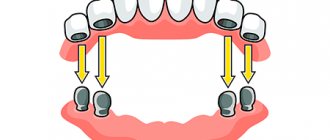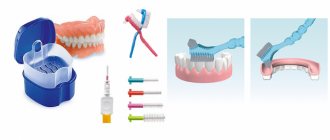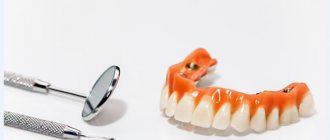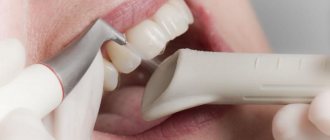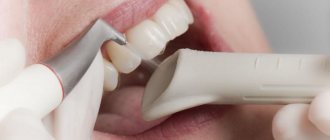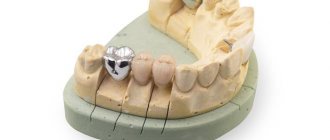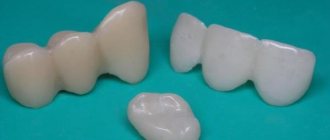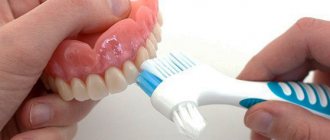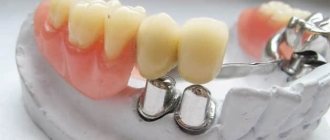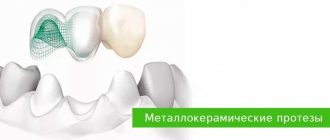From this article you will learn:
- how to care for dentures made of plastic,
- how to store dentures at night,
- cleaning dentures.
The article was written by a dentist with more than 19 years of experience.
Caring for dentures is a whole range of activities, which includes not only daily hygienic care of the denture, but also its regular disinfection, as well as compliance with the rules for its storage. In most cases, patients do not properly care for their dentures, which quickly makes them unusable.
For example, out of habit, you may begin to clean your dentures with regular toothpaste and a brush, which will lead to the appearance of small scratches on it. As a result, the surface of the denture becomes rough, which leads to the rapid deposition of plaque and tartar on it, the appearance of age spots, and the denture itself begins to smell bad. But caring for removable dentures is not so complicated - you just need to follow a few simple rules, and then your denture will serve you for a long time.
How long does it take to get used to removable dentures?
On average, 30 days. At the beginning of use, removable dentures feel like a foreign body and can cause discomfort. They can interfere with the production of sounds (diction), cause increased salivation, changes in taste and temperature sensations, and difficulty biting and chewing food. Sometimes, when applying removable dentures, the urge to vomit may occur. It is also possible that the dentures do not adhere satisfactorily, or food debris gets underneath them, or biting the cheeks, lips, or tongue. All these phenomena decrease by the end of the first week of wearing the prosthesis and disappear after 3-4 weeks. After an adaptation period, the patient already feels more comfortable with prostheses than without them.
The main condition for quickly getting used to prostheses is their constant use. The rules and recommendations below will help you shorten the adaptation period.
How to quickly get used to new dentures
- Immediately after submitting the finished work in the dentist’s chair, learn how to remove and put on removable dentures yourself. At home, practice again, first in front of a mirror, then without it.
- Before applying, soak removable dentures in water or use a fixative.
- For the first one and a half to two weeks after the application of dentures, they should not be removed from the mouth, even at night. Take them out only for cleaning and oral hygiene.
- To reduce the gag reflex, try sucking the candy by placing it towards the roof of your mouth and holding it in this position with your tongue.
- Rinse your mouth often with warm water (8-10 times a day) or drink hot tea.
- Reading aloud in a calm, relaxed atmosphere for 2 hours helps to quickly restore correct pronunciation. In most patients, diction is restored quite quickly (after 5-6 days)
- For the first 2-4 days of wearing the prosthesis, try to eat soft foods and not load the prosthesis until you fully adapt to it. Try not to bite with your front teeth. Chew your food slowly and thoroughly.
- Chew food with your side teeth at the same time (left and right at once). Cut food into small pieces. Introduce more fruits and vegetables into your diet (this will allow you to switch to your usual diet earlier).
What are the main rules when using removable dentures?
Dentures must be clean. After each meal, they should be removed from the mouth and washed thoroughly with soap and water.
Removable dentures should be protected from mechanical and chemical damage, as well as from exposure to high temperatures. If cracks or breakages appear in a removable denture, you cannot use it; you must consult a doctor for repairs.
Do not take breaks from wearing a prosthesis for more than one and a half to two weeks, because... this can lead to an initial discomfort that can make it difficult to fit the prosthesis exactly into place. As a rule, if a prosthesis is not used for more than a month, it becomes unusable and a new one needs to be made.
We use ultrasonic baths
Another effective remedy is special ultrasonic baths. With their help, you can clean the denture from stone and plaque, eliminate unpleasant odors, and eliminate harmful microorganisms and bacteria.
If you buy an ultrasonic bath, you can save on additional chemicals. In addition, there will be no need to use a toothbrush. Such baths cost about 2,800 rubles for 2018.
On a note! In addition to dentures, these baths can be used to clean baby nipples and bottles, as well as jewelry.
Video - How to care for artificial teeth
What is prosthesis correction and when should it be done?
After applying removable dentures in the oral cavity, as a rule, pain appears in some areas underneath. This is due to the inevitable gradual subsidence (pressure) of the removable denture on the mucous membrane. This factor cannot be fully taken into account when designing these orthopedic structures, therefore, correction is necessary to eliminate unpleasant sensations. It consists of “undermining” the dentures in those areas where it presses on the oral mucosa.
The first correction must be carried out the next day after the start of using dentures. The next 3-4 corrections must be carried out over a period of one and a half to two weeks as necessary. You may need more visits to the dentist after completing your work (up to 10).
In case of severe pain, you need to remove your dentures and put them in a special container or glass of water. Before going to the doctor for correction, you must wear dentures and walk around with them for at least 3-4 hours. This will allow the doctor to see a clear imprint on the mucous membrane and correct only the place that is rubbing the gum. Bringing a denture in your pocket and pointing your finger in your mouth is useless. In removable dentures, every centimeter, and sometimes even a millimeter, of the supporting surface is of great importance. If the correction is inaccurate, the fixation of the prosthesis may be impaired. This is exactly what happens if you try to grind or file dentures yourself. After correction (adjustment) of removable dentures, you must not use them for 1 day. During this period (during the healing period of the namin), it is advisable to rinse your mouth and make baths (hold the solution in the mouth at the site of the namin) with herbal decoctions. Use a decoction of chamomile flowers, oak bark, etc. For example, take 0.5 tablespoons of dry oak bark, brew in one glass of boiling water, cool, apply the decoction 3-5 times a day. You can also use medicines, for example Kamistad gel, sold in pharmacies.
Feel free to visit your dentist for adjustments. Removable dentures, even if they are made in the most careful manner, require correction. Even if you do not experience any pain or discomfort, you should visit the dentist for an oral examination.
WARNING : Do not attempt to straighten dentures yourself with a file or any other tool. This can lead to breakage of the prosthesis and disruption of its fixation. Moreover, after such “repairs” it is no longer possible to do anything with the prostheses in the clinic. As a result, all that remains is the manufacture of new orthopedic structures.
Frequently asked questions from users
Question from Tatyana R.: Hello, is it possible to whiten dentures with whitening strips? I have clasps, and my teeth are darkened on them, and the toothpastes don’t help at all.
ANSWER: Hello, Tatyana. Using whitening strips, you can seriously harm your supporting teeth and gums if the active gel from them penetrates under the denture. Even if there is a microscopic gap between the hooks or attachments and the gum, this is quite likely. If you whiten the denture in strips after removing it from your mouth, this is also not the best solution - stains and cracks may appear on the base and teeth. To clean orthopedic structures, it is better to contact dentistry. The doctor will assess the condition of the dentures, clean and polish them using professional methods. But if the pigmentation has penetrated very deeply into the coating, repair or replacement of the prosthesis may be required.
[1] Lebedenko I.Yu. Prosthetic Dentistry: National Guidelines, 2021.
Author: Dulgarov Zh. G. (Thank you for your help in writing the article and the information provided)
How to care for removable dentures
Proper care of them is of great importance for the period of adaptation (adaptation) and the service life of prostheses. Removable dentures require regular cleaning. The best option is to clean dentures daily after each meal under running water. The obligatory minimum is cleaning the prosthesis before going to bed. The main criterion is that the prosthesis must be as clean as on the first day. The cleaner the denture, the more comfortable you will feel it in your mouth.
When cleaning a denture with whitening toothpaste, scratches may form on it, which contributes to the rapid accumulation of plaque on the denture, because Such pastes contain abrasive substances, so for daily care you can use a weak soap solution.
Dirty removable dentures cause rapid wear and tear and inflammation in the oral cavity. If there is inflammation of the mucous membrane in places of contact with a removable denture, pain, or burning, you should immediately consult a doctor. From strong tea, coffee and smoking, removable dentures lose their appearance, turn yellow, and a brown coating appears on them. With good care, removable dentures retain their color and shine for a long time.
An indicator of good care is the absence of food and plaque on the prosthesis. To remove age spots from coffee and nicotine, etc., which may appear over time, you should consult a doctor. The dental technician will restore the necessary polish and shine.
To clean dentures, you can use special cleaning agents sold in pharmacies (President, Corega, Protefix). They also help get rid of plaque and destroy bacteria that cause bad breath. The prosthesis is placed in a glass of clean water and a tablet is lowered; the prosthesis is kept in the solution for a certain time recommended by the manufacturer.
Types of structures
There are two types of dentures: removable and fixed. Nylon and acrylic models are removed and can be cleaned with running water, preferably boiled. But it is better to clean with special solutions that are effective in getting rid of bacteria. They are purchased in pharmacies in ready-made form or in tablets dissolved in water. To fix such structures, glue, cream or strips are used.
These care methods also apply to partially removable structures, which include clasp models. Fixed veneers, implants, bridges, crowns require more careful care. Dental floss is used to clean hard-to-reach areas. Interdental brushes are also effective. You need to complete the procedure of cleaning from food debris by rinsing your mouth using special products.
How to improve the fixation of removable dentures
The anatomical conditions in the oral cavity do not always allow for the creation of good fixation for removable dentures. This especially applies to prosthetics for the complete absence of teeth in the lower jaw. Under unfavorable conditions, special fixing agents in the form of creams, fixing pads, and powders are used to keep it in the mouth. They are sold under the brands “President”, “Corega”, “Protefix” in any pharmacy.
The fixing cream is applied in a thin broken line to the prosthesis. Before applying the cream, removable dentures must be dried, for example with a cotton swab. Fixing powder is used for low salivation. It is applied in a thin layer to the wet denture, after which the removable dentures can be put on. Your dentist will help you decide on the choice of fixative.
Care products
Modern means for caring for dentures are varied and more effective than the old-fashioned solutions with soda and potassium permanganate, which will do more harm than good. They are specially designed for different types of structures, therefore they are absolutely harmless.
Care products can be fixative or cleansing. The most popular of them are fixing adhesives and creams. They contribute to a reliable fit of the prosthesis and redistribution of the load during chewing. It prevents food debris from getting under them and does not rub the gums, since the glue creates an airtight cushion. At night, the structure with fixing substances must be removed, this is the condition for their use.
Fixing powder is suitable for people with weak salivation. A thin layer of powder is applied to the structure, which is pressed tightly against the gums, creating an obstacle to food particles. And strips of special canvas for fixation are necessary if a person has an abnormal jaw structure.
Another common remedy is special tablets that dissolve in water. This solution can not only clean dentures, but also whiten them. True, they do not work on persistent nicotine stains; you will need the help of a dentist who will remove them with ultrasound. This needs to be done every six months.
Rinsing, cleaning, disinfection, professional care - these are the main components of the care process. And what means are used for them will depend on the specific model of prostheses.
What to do if your prosthesis breaks?
During the use of removable dentures, a fracture of the prosthesis or its individual parts (tooth, clasp) may occur. In this case, you need to consult a dentist. If a tooth(s) on which partial removable dentures are held or supported are lost, it is possible to weld an artificial tooth to the denture in place of the lost one. Repairing a removable denture takes 2-3 days. Repairs are made without warranty.
In case of cracks, fractures, etc. Do not try to fix the denture yourself, even if urgently. Only specialists can repair the prosthesis.
Making new removable dentures takes about 1 week. The warranty period for plastic removable and clasp dentures is usually up to 1 year. During the warranty period, the prosthesis is repaired or altered free of charge. After the warranty period expires, the work is paid in full.
In what cases is it necessary to contact a dentist?
If you notice a burning sensation in the mucous membrane, severe dry mouth, skin rash and other unusual symptoms, you should contact your dentist, who, if necessary, will refer you to an allergist for allergy tests.
Once a year it is necessary to reline the removable denture. The fact is that while wearing a prosthesis, atrophy of the mucous membrane and bone tissue occurs under it. Because of this, a void appears between the prosthesis and the mucous membrane and the prosthesis does not fit tightly to the prosthetic bed. To eliminate these negative aspects, the prosthesis is relined - plastic is placed in place of the void formed due to atrophy and a tight fit of the prosthesis is restored. If relining a removable denture is done at the wrong time or not done at all, the removable denture becomes unusable.
Visit your dentist at least twice a year, consult with him about the specifics of caring for your oral cavity, and use special devices and medications recommended by him, if necessary!
